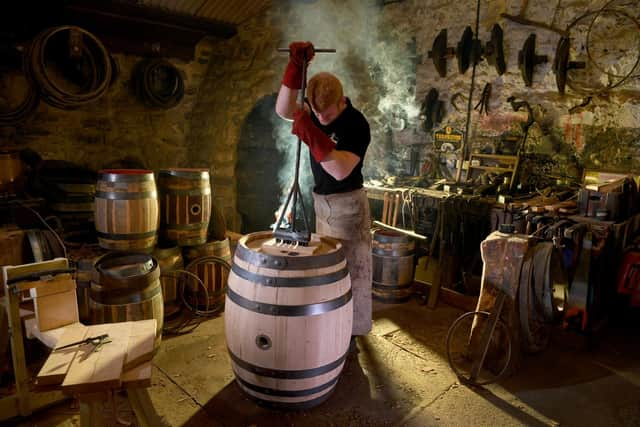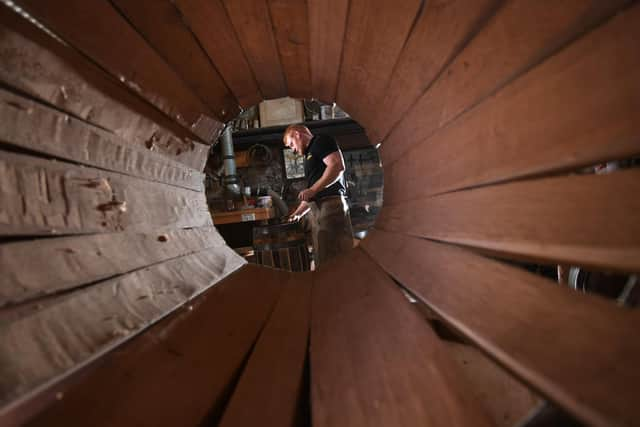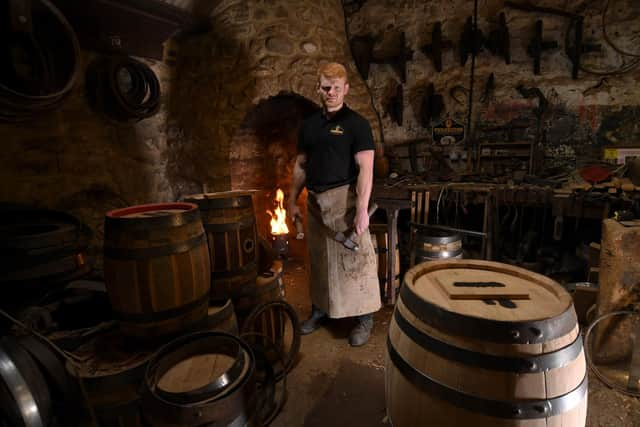Meet Theakston Brewery's new journeyman cooper at its base in North Yorkshire's Masham
They put Euan Findlay in a barrel on his last day as an apprentice cooper. “It was like a washing machine,” he says, “but instead of getting clean, I was getting dirty.”
His employers at Masham-based Theakston Brewery weren’t being unkind, but continuing a ceremony known as “trussing in”, a historic rite of passage thought to date back to the 14th century. That’s why Euan was doused in stagnant matter and rolled in a barrel around the brewery yard at Masham, the first such ceremony there in more than 20 years. “I knew it was coming from the day I started,” he says.
Advertisement
Hide AdAdvertisement
Hide AdEuan had to help build his own barrel. “What happens is the largest cask size we make is a hogshead, 54 gallons,” he says. “The apprentice has to get all the staves ready for a hogshead, raise them up into a hoop so that they are stood up and splayed out.”


Once the wood had started to bend, they flipped the partially made barrel and Euan climbed inside. “Once the cask was bent around me, they got buckets of rubbish, hops, and yeast and old beer, wood chips, and knocked that cask over and rolled me round a few times. After that they fired me, and I had to ask for my job back.”
The ceremony was watched by his family and friends, landlords, Theakston employees and others, including Ed Sheeran’s manager. “Just a bunch of random folk, I didn’t know half of them, but it was lovely to see my family and friends there.”
As a journeyman cooper, Euan joins a line stretching back nearly 200 years at one of only two breweries still to make traditional oak casks. As far as he knows, Euan was the only apprentice cooper in England while he was training. There are six coopers now in England, he thinks, but many more in Scotland for the whisky industry.
Advertisement
Hide AdAdvertisement
Hide Ad

Funnily enough, Euan, 25, comes from the land of whisky as he was born in the town of Alexandria by Loch Lomond, outside of Glasgow. He still has the accent, even though he has spent far more time in Yorkshire now, although when he returns his friends think he’s as English as English can be.
Playing rugby led him to the job. He plays for Ripon and the team is sponsored by Theakston. His coach asked him one day if he would like to be a cooper and in 2015 he stepped for the first time into the mystifying world of wood and metal hoops and techniques unchanged for centuries.
“My boss put me through some challenges to see if I’d quit and I didn’t quit. I was rubbish but then grinded it out over the weeks, and just learned to love it.”
Coopering is a practical job with a touch of showmanship, as Euan attends shows and conferences, acting as an ambassador for the brewery.
Advertisement
Hide AdAdvertisement
Hide Ad

Those two sides are evident at the coopery. The workshop where Euan makes the wooden casks from German oak is full of metal and hoops and old barrels and new barrels, with tools hanging everywhere and lying on the workbenches.
This is a place of serious and skilled work, yet at one end of the room there is a wide window to the Theakston’s visitor centre next door.
“People come and watch me, it’s a bit like a fish tank,” he says, but he is proud to be keeping an old tradition alive. “Coopers used to be everywhere. Every town, every city and every village had a cooper for everything, not just for beer, for flour, tobacco, fish – it was the standard container.”
Evidence of a long heritage lies in some of his equipment. The truss hoops he uses are more than 100 years old and come from the old Lightfoot brewery in Masham that shut in 1917.
Advertisement
Hide AdAdvertisement
Hide AdThese heavy hoops hold the staves in place, until Euan is ready to hammer out the thinner metal strips that will constrict the wood more tightly.
Most Theakston’s beer now goes out in metal barrels, leaving about 20 wooden casks a week. These casks are branded on the header with the brewery name or that of the intended pub.
One cask in the workshop is marked up for the Craven Arms of Appletreewick.
Euan’s work falls into two main areas, making new timber casks or remaking old casks. The art in a cask lies in shaping the oak staves so that they fit together perfectly. He illustrates this by picking up a piece of wood and one of the finished staves.
Advertisement
Hide AdAdvertisement
Hide Ad“The most difficult part of coopering is to turn a bit of wood like that into this, to make a coffin shape and it’s all got to be done by eye.”
He uses an axe for this task, placing the staves on an old tree truck for a chopping block. “There are only a few people in the world who can do that now,” adds Euan.
Much of his job involves inspecting returned casks and repairing broken staves or adding new hoops. “The first thing I do when they come back is smell them and make sure there’s no off notes in there. We want them to smell sweet, we want sweet flavours from the wood.”
The barrels, new or repaired, are made only from wood and metal, while Norfolk reeds act as a seal against leaks. “There’s no glue or anything, nothing other than wood to wood, and when you bring those hoops down, that’s going to squeeze everything in. Also, we work with the wood when it’s dry. We let it season for about a year, get it nice and dry.”
Advertisement
Hide AdAdvertisement
Hide AdBefore beer goes in, Euan puts a cask to soak. “Let’s say it’s a nine-gallon cask, I’ll put a pint of salt in there and I’ll fill it up with hot water. The wood will expand since the wood is dry, and it will swell up.”
Oak is always used. The wood has medullary rays that run across the rings marking the tree’s age, and these bend and help the barrel to keep its shape. “Nothing’s going to get through,” Euan says.
No chemicals are used, and the barrels are cleansed only with hot water and steam.
A beer barrel is usually one of five sizes: pin, firkin, kilderkin, barrel and hogshead. The smallest size is used as a prize for winners at the annual Theakston Old Peculier Crime Writing Festival held in Harrogate – filled with beer naturally.
Advertisement
Hide AdAdvertisement
Hide AdThe head brewer produced a beer for Euan’s trussing in ceremony. “I asked for something light, medium strength and hoppy and we put that into a wooden cask. I pulled the first pint, everybody loved it.”
Euan has been swept up by this calling. “I never knew that I loved wood so much. Just through working with casks, it’s translating into other things. I can do all sorts now I never knew I could do,” he says.
In his own time, he turns old barrel ends into clocks. “This job has opened a lot of doors for me, and I’ve got a trade for life. Theakston treats me with a lot of respect, they look after me and I am happy.”
In return, he is more than content to be the modern face of coopering. “Most people my age don’t even know what a cooper is,” he says. “Everyone knows what a barrel is, but they don’t know what a cooper is.”
Comment Guidelines
National World encourages reader discussion on our stories. User feedback, insights and back-and-forth exchanges add a rich layer of context to reporting. Please review our Community Guidelines before commenting.
